Zaka: The volunteers giving dignity to Israel's dead
- Published
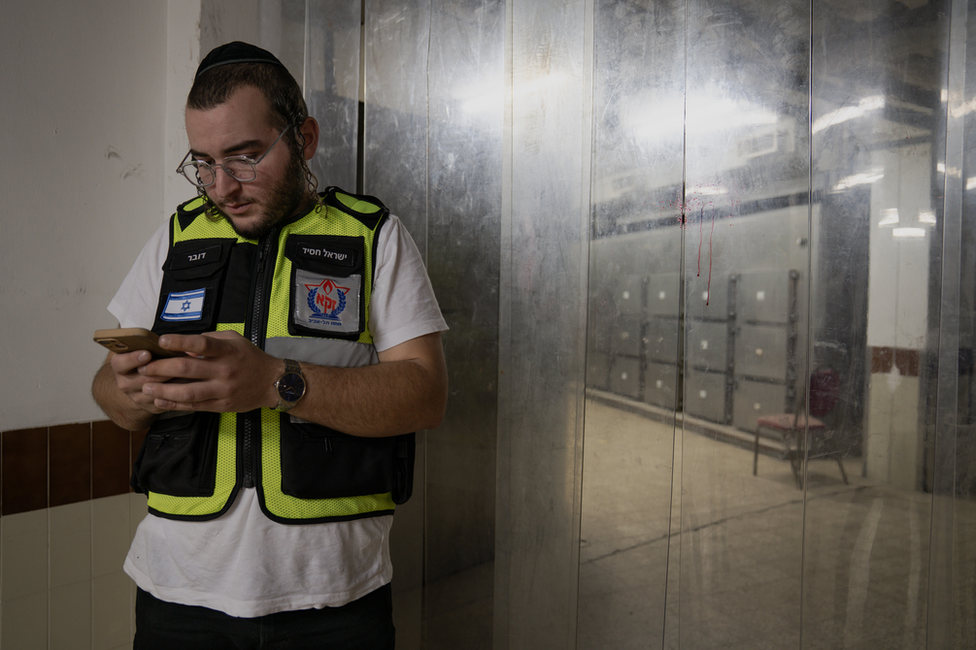
Zaka volunteer Israel Hasid awaits the arrival of hundreds of bodies at a morgue in Tel Aviv
Warning: This article contains details that some readers may find distressing
Behind the tall, barbed-wire gates of a military base in central Israel last week, away from the public eye, soldiers, police officers, and forensics experts were working diligently on a task that was almost impossible to imagine from the outside - the mass identification of the victims of Hamas's murderous attack.
Working alongside them late into the night, under the harsh glare of floodlights, was another group, identifiable by their bright yellow vests. They were Zaka, a religious organisation which, since the attack, has been responsible for some of the toughest work taking place in Israel.
Zaka's job is to collect every part of the remains of the dead, including their blood, so that they can be buried in accordance with Jewish religious law. The organisation is called on to deal with the most traumatic events, including natural disasters, suicides from buildings, and terrorism.
Its members are almost all ultra-orthodox Jews, and they are all volunteers.
When Hamas began its rampage through southern Israel last Saturday, Zaka volunteer Baroch Frankel, 28, was observing the Sabbath as usual at his apartment in Bnei Brak, an orthodox city near Tel Aviv where many of the volunteers live. About mid-morning, he heard over his Zaka walkie-talkie that there was some kind of emergency under way.
The walkie-talkie was allowed to be on because the Sabbath can be broken for matters of life and death, but it wasn't until sundown that Frankel could look at his phone and he fully understood the scale of the attack. He grabbed his kit, containing body bags, surgical gloves, shoe covers and rags for soaking up blood, and jumped in his car. "I just drove," he said.
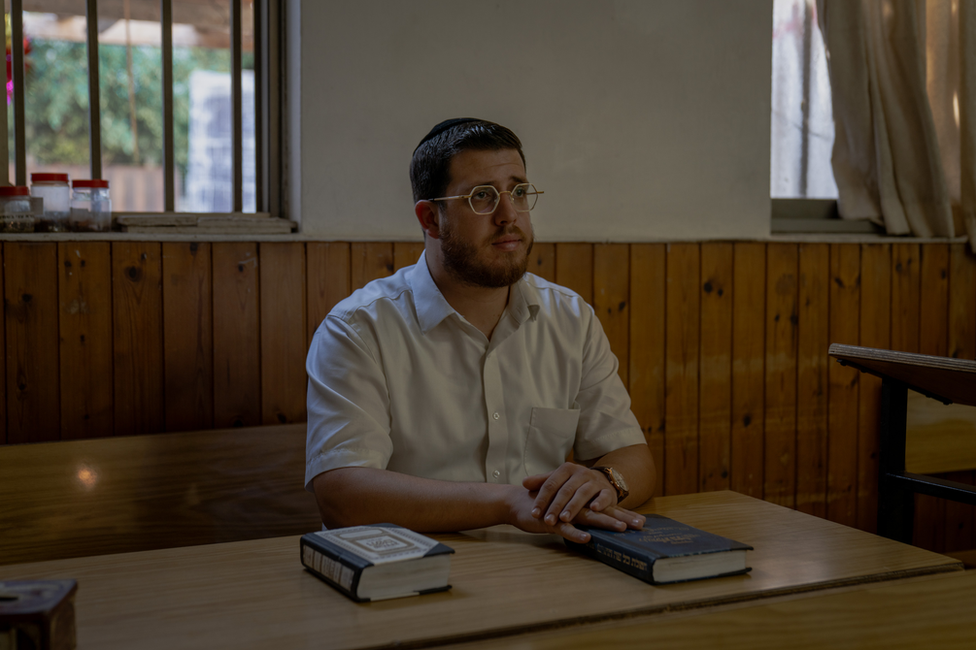
Baroch Frankel in his synagogue in Bnei Brak
Zaka was formally established in 1995 but has roots dating back to 1989, when its founder was one of a group of religious volunteers who gathered to recover remains after a suicide attacker seized the wheel of a public bus in Israel and drove it into a ravine.
There is no equivalent organisation in the UK, where professional police teams recover human remains. But in Jewish custom, bodies should be collected to the fullest extent possible and all the available remains buried together. The volunteers from Zaka ensure that this is done properly and, as their motto states, with "true grace".
At the site of the music festival on Saturday, the volunteers would face a sprawling scene daunting even to them. It was still dark when Frankel arrived, and Israeli soldiers were still exchanging gunfire with Hamas, so he lay on the sand waiting until it was safe. Then he went to work.
Zaka volunteers have been working since at all the sites of the attack. They retrieve the bodies in two-hour shifts because the work is so tough. Dealing with the remains of the children was the worst, Frankel said. As he moved from the festival site to a nearby kibbutz on Saturday, the police warned even the Zaka teams - who are widely known to be experienced in this work - that what was inside was difficult to see.
Inside, Frankel found burned children, people blown up with grenades and families gunned down in their homes. "You don't understand how many babies, how many burned people I counted," he said. "When I talk to you now I see these images again in front of my eyes."
For this work, particularly in this moment, the Zaka volunteers are sometimes praised by people who see them in the street in their yellow vests. Walking through his neighbourhood in Bnei Brak this week, Frankel shrugged off the praise.
"Zaka is a sacred service because you ask no thanks," he said. "The dead cannot pay you back."
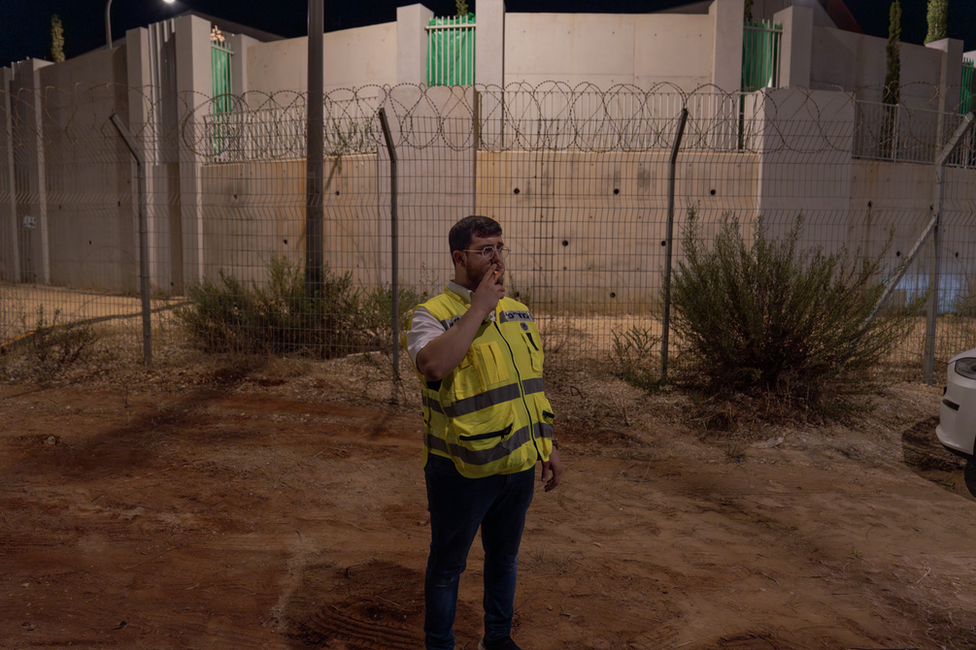
Frankel, breaking to smoke outside the walls of the army base where the bodies are processed
On Wednesday evening, the Zaka volunteers had just finished the last of their work collecting remains in southern Israel and Frankel was driving an hour north to the military base where the bodies were being processed.
Inside the base, there were about 20 massive cold storage units, like shipping containers, lined up to hold the bodies. The rabbis and Zaka volunteers were doing everything in their power to preserve the dignity of the dead, despite the scale of the operation and the condition of some of the remains. They took care to pause and say prayers over each person, where possible, and the orthodox among the workers gathered every 15 minutes to say their own prayers while the work continued around them.
Yacoub Zechariah, 39, the deputy mayor of Frankel's home city of Bnei Brak, was on his fifth straight overnight shift for Zaka at the base. "Physically, it's hours upon hours without sleep and carrying corpses is hard work," he said. "But we overcome it."
Zechariah, a father of five, had seen bodies of children brought in with terrible injuries and burns, he said. Some had been decapitated, although it was not clear how. Some of the dead children had their hands and feet tied with phone cables.
Zechariah pulled a body bag from a truck with a family name written on it in marker. The next bag had the same name, and the next. Eventually he had pulled five members of the same family from the truck. They were two parents and three young children who had been murdered by Hamas in their home in the kibbutz in Kfar Azza.
"Seeing an entire family killed is something that breaks a human being," Zechariah said. "I have five children of my own. We are people of faith and we know that everything comes from God, but this is difficult for us to understand."
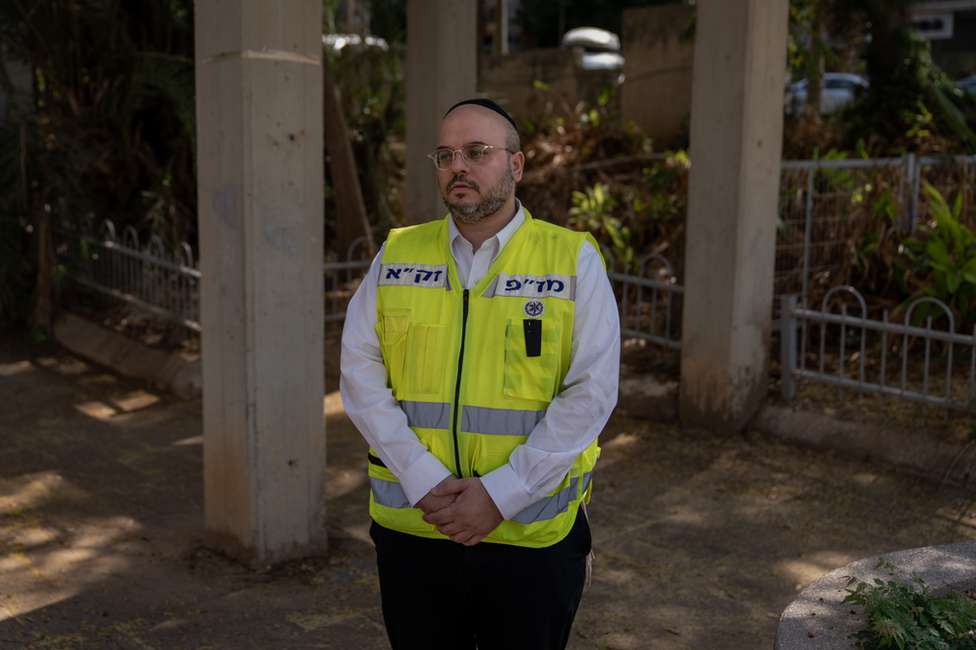
Yacoub Zechariah in his Zaka yellow vest
When Zechariah had checked the faces of the family and they had been moved into storage, he walked to the edge of the area where the bodies were being processed and wept. A few hours later, at 5am, he finished his shift and sat quietly in his car to drink a coffee and smoke a cigarette. Then he drove half an hour home to his family in Bnei Brak, slept for two hours and drove to City Hall to begin his day as deputy mayor.
Outside the gates at the base, away from the horrors inside, family members of the dead were camped on lawn chairs on the roadside, supported by food trucks and donations from local residents. Ortal Asulin had been sleeping on the roadside since she first learned on Saturday that her brother, a famous ex-footballer called Lior Asulin, had been caught up in the attack.
"No one will give us answers, it is a big mess inside," she said, looking totally shattered. "We go to ask every five minutes, everyone here knows us, our names, our phone number, my brother's name, and his picture. He was a famous footballer, only one person needs to see him inside there to know it is him."

More on Israel Gaza war
Follow live: Latest updates
History behind the story: The Israel-Palestinian conflict
Gaza maps: What life is like in the Gaza Strip
Kibbutz massacre: Hamas attack captured by Israeli mothers' WhatsApp group

At that moment, Frankel overheard her and recognised her brother's name. "I saw him," Frankel said. "I saw his face, I'm sure."
Ortal crumpled onto the pavement in tears. The rest of the family rushed around Frankel as he tried in vain to reach a colleague inside to confirm that Lior had been seen. The police said they had no information and they would not let the family inside.
"It is not possible to locate the body at the moment," said a tired but kind police sergeant. "In the end they will remove it, they are doing everything they can but they must be given some time."
Many similar conversations had been had outside the base, said the police sergeant, who was not permitted to give her name. "There are a lot of dead people inside and we need to make sure 100% sure that we have the correct person before we tell the family," she said. "We are five days now after the event and this has an effect on the bodies, you understand? We cannot have any mistakes."
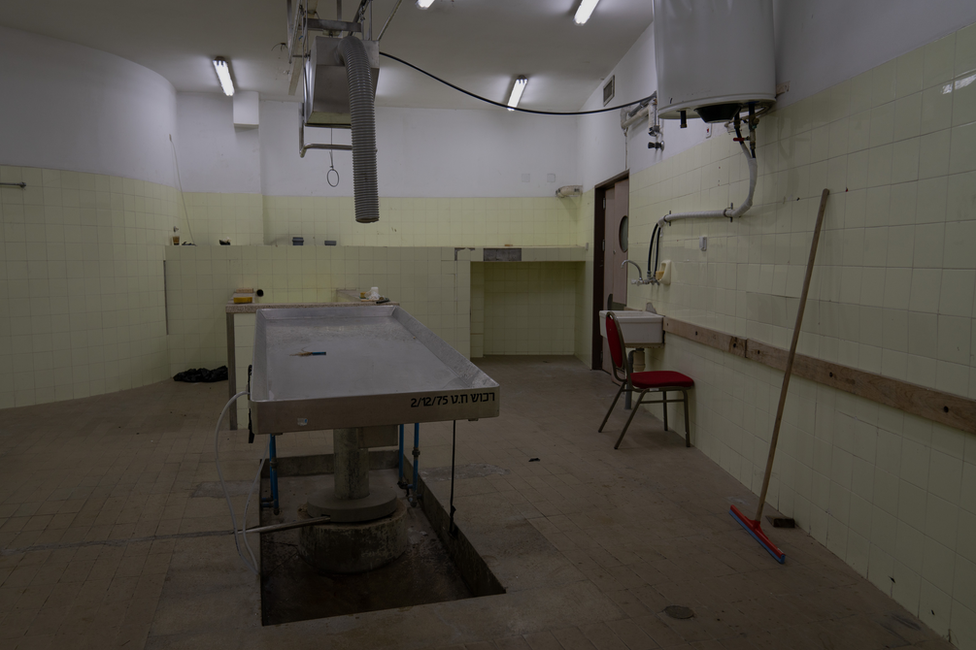
A room at a Zaka centre in Tel Aviv where the bodies are brought to be purified, according to Jewish custom
For Jewish people, a delay in burying a body can add enormous pain to the loss. They believe that a person should be buried as soon as possible so that their soul can rise up to heaven. And until the dead are buried, the family cannot begin formally to grieve. Like the soul of the person who has died, they are in limbo.
Lior Asulin, the football player, was finally identified and buried on Thursday. Zaka is also involved in these final stages of the process. Many of the bodies go from the military base to a Zaka-run centre in Tel Aviv, where on Thursday volunteer Israel Hasid was painstakingly preparing to receive them. He expected that the work would continue around the clock and through the weekend, so he had sought special permission from a rabbi to work on the Sabbath.
There will be some police presence at the centre for technical exams involving DNA and dental records, but otherwise Hasid and the other Zaka Tel Aviv volunteers will take responsibility for all of the purification necessary before burial. They will wash the bodies in water taken from a river that runs alongside the building and gently clean them with cotton. They will cut their hair and nails if needed.
"In these circumstances, because of the nature of this attack, in many cases the job cannot be perfect," Hasid said. "But we will do everything we can."
At the end of the process, the Zaka volunteers would wrap each person's remains carefully in a white linen sheet and pass them on to undertakers to be buried, he said, so that the souls of the dead could escape and their families could begin to grieve.
Idan Ben Ari contributed to this report. Photographs by Joel Gunter.

More on Israel Gaza war
Follow live: Latest updates
History behind the story: The Israel-Palestinian conflict
Gaza maps: What life is like in the Gaza Strip
Hamas' attack on Israel: The volunteers giving dignity to the deadd
